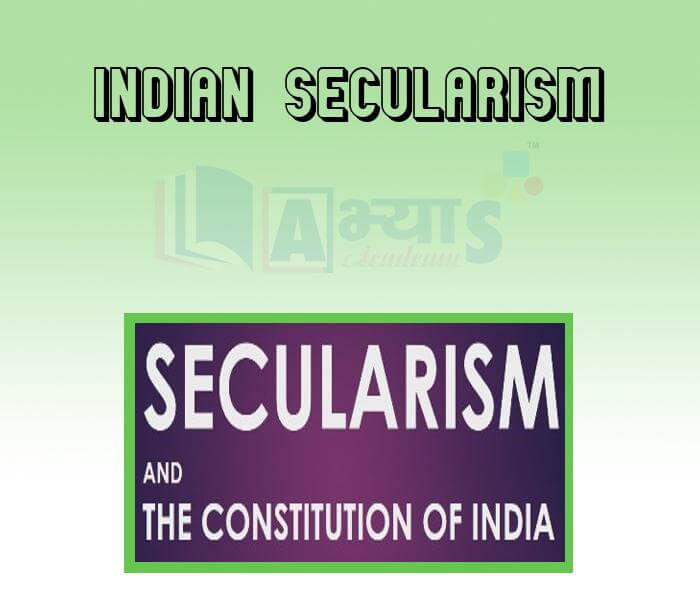Indian secularism









Indian secularism
What is Indian secularism: The Indian constitution mandates that the Indian state be secular.
1. That one religious community does not dominate another
2. That some members do not dominate other members of the same religious community
3. That the state does not enforce any particular religion nor take away the religious freedom of individuals.
First, it uses a strategy of distancing itself from religion. The Indian state is not ruled by a religious group and nor does it support any one religion. The second way in which Indian secularism works to prevent the above domination is through a strategy of non-interference. This means that in order to respect the sentiments of all religious and not interfere with religious practices, the state makes certain exceptions for particular religious communities.
The third way in which Indian secularism works to prevent the domination listed earlier is through a strategy of intervention. In order to prevent religious- based exclusion and discrimination of ‘lower castes’, the Indian constitution bans untouchability. In this instance, the state is intervening in religious in order to end a social practice that it believes discriminates and excludes, and that violates the fundamental rights of ‘lower castes’ who are citizens of this country.
The intervention of the state can also be in the form of support. The Indian constitution grants the right to religious communities to set up their own schools and colleges. It also gives them financial aid on a non- preferential basis.
Laws by themselves cannot make the fundamental rights more effective. Many laws have been enacted to protect the right and interest of women, the schedule casts and tribes and other exploited groups. But they continue to be exploited and their fundamental rights are taken away. Atrocities and human rights violation take place at regular intervals. That is because most of the poor are not even aware of these laws. To make these laws more effective, the people have to be educated and made aware of their rights and the many laws present in the constitution for their protections.
In what way is Indian secularism different from that of other democratic countries: There is one significant way in which Indian secularism differs from the dominant understanding of secularism practiced in the United States of America. This is because unlike the strict separation between religion and the state in America secularism. In Indian secularism the state can intervene in religious affairs. In Indian secularism, thought the state is not strictly separate from religion it does maintain a principled distance vis-à-vis religion.
This means that any interference in religion by the state has to be based on the ideals laid out in the constitution. The Indian state is secular and works in various ways to prevent religious domination. The Indian constitution guarantees the fundamentals rights that are based on these secular principles.
Students / Parents Reviews [10]
One of the best institutes to develope a child interest in studies.Provides SST and English knowledge also unlike other institutes. Teachers are co operative and friendly online tests andPPT develope practical knowledge also.

Aman Kumar Shrivastava
10thBeing a parent, I saw my daughter improvement in her studies by seeing a good result in all day to day compititive exam TMO, NSO, IEO etc and as well as studies. I have got a fruitful result from my daughter.

Prisha Gupta
8thMy experience with Abhyas academy is very good. I did not think that my every subject coming here will be so strong. The main thing is that the online tests had made me learn here more things.

Hiya Gupta
8thAbout Abhyas metholodology the teachers are very nice and hardworking toward students.The Centre Head Mrs Anu Sethi is also a brilliant teacher.Abhyas has taught me how to overcome problems and has always taken my doubts and suppoeted me.

Shreya Shrivastava
8thIt has a great methodology. Students here can get analysis to their test quickly.We can learn easily through PPTs and the testing methods are good. We know that where we have to practice

Barkha Arora
10thMy experience was very good with Abhyas academy. I am studying here from 6th class and I am satisfied by its results in my life. I improved a lot here ahead of school syllabus.

Ayan Ghosh
8thIt was a good experience with Abhyas Academy. I even faced problems in starting but slowly and steadily overcomed. Especially reasoning classes helped me a lot.

Cheshta
10thI have spent a wonderful time in Abhyas academy. It has made my reasoning more apt, English more stronger and Maths an interesting subject for me. It has given me a habbit of self studying

Yatharthi Sharma
10thIt was good as the experience because as we had come here we had been improved in a such envirnment created here.Extra is taught which is beneficial for future.

Eshan Arora
8thAbhyas Methodology is very good. It is based on according to student and each child manages accordingly to its properly. Methodology has improved the abilities of students to shine them in future.
